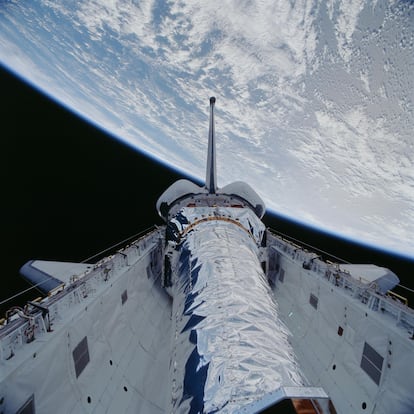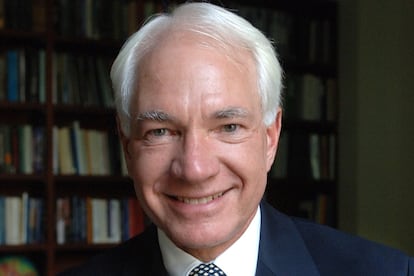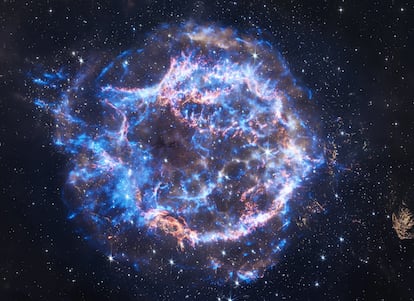NASA astrophysicist Claude Canizares: "With Trump's budget, the government is firing a machine gun at everyone."

American astrophysicist Claude Canizares says his surname should be Cañizares with an ñ, like his father, a Cuban doctor who emigrated to France in the 1930s and later settled in the United States. This scientist is now 80 years old, having spent 50 of them as an astrophysicist at the Massachusetts Institute of Technology, one of the country's top universities, where he served as director of scientific research and deputy director. Canizares co-directs NASA 's Chandra Space Telescope, which this year celebrates its 26th anniversary in operation. The instrument's days may be numbered due to the brutal 50% cuts planned by US President Donald Trump at the American space agency.
Canizares is one of more than 300 signatories of a letter published this week warning of the "catastrophic" consequences of these cuts, which are unprecedented in the country's history.
Trump hasn't just attacked NASA. He's also targeted the National Institutes of Health , the world's largest biomedical research organization, the National Science Foundation , the National Atmospheric Administration, the Environmental Protection Agency, and some of the nation's top universities, where hundreds of layoffs and budget cuts are expected, jeopardizing U.S. dominance in global science.
According to a recent study, these cuts will ultimately lead to a decline in the country's wealth similar to that of the Great Recession of 2009. Employees of the aforementioned organizations have also rebelled against these policies with manifestos . Many of them dare not speak publicly, or even give their names. Canizares, who has just become an emeritus professor after a long career, says he no longer fears retaliation. In this teleconference interview, he explains that the consequences of this attack on science could even threaten the lives of astronauts.
Question : Why did you decide to sign the manifesto?
Answer: There are still enormous questions to be answered, and the international scientific community spends a good deal of time deciding which scientific projects should be prioritized, which ones are most likely to yield the greatest discoveries in all fields. The United States government has ignored this effort and imposed incredible, completely arbitrary cuts. They are unaware of the tremendous consequences they will have. With the letter we signed, the Voyager Declaration , NASA scientists warn that these arbitrary cuts endanger even the safety of our astronauts. It is extraordinary to see NASA scientists criticizing their own institution, because many of the signatories are the most knowledgeable about each program. When something like this happens, the government must listen.

Q. Is there any precedent for what is happening?
R. I've never seen anything like this in my life. It's unprecedented.
Q. How would you describe the current situation in the country's academic community?
A. For the most part, these attacks are unjustified. With these budgets, the government is firing a machine gun at everyone. No one would do that with their personal finances. It's inconceivable.
Q. What other impacts might these cuts have on NASA and other public agencies?
A. The effect will be devastating. First, on the workforce, especially the younger generations. They are the ones who must make the discoveries of the future, and they are being denied the opportunity. These people are losing their jobs and will likely leave for another country. Furthermore, the United States benefits enormously from young people from other countries who come to study and, in many cases, remain as professors and researchers at the country's best universities, such as MIT. Just look at the number of Nobel Prize winners from the United States who were born outside the country; it's enormous. In my own research group, we have brilliant students who are going to return to their countries due to the uncertainty they face here.

Q. Is there fear of government retaliation?
A. Yes, there is. If a country's scientists can't tell the truth, then we've failed as a society. Universities are under attack; there's an open war between Harvard and the government. I was born and raised in the United States. Universities were the crown jewel, one of the things that made our country stronger, both for national security and for the advancement of science. And all of this is in jeopardy because of politicians who ignore the consequences of their actions.
Q. You've met many US presidents. What do you think of Trump?
A. I'm ashamed that the United States has elected a president who celebrates ignorance, which is what Trump does. Science policy decisions should be reserved for experts. We all accept that budgets aren't infinite, but they must be managed intelligently, not recklessly.
Q. Is there any hope that the situation can be reversed?
A. Many of my colleagues at MIT and other institutions are prepared to sit down with the Trump administration to make the best possible decisions. Anything is better than machine-gun politics. I don't think the scientific community will become fervent Trump supporters, but we can help manage the budget without sacrificing future workers and scientific discoveries.

Q. Do you think the Trump administration will agree to sit down and negotiate?
A. I don't know. It's hard to be optimistic at this point. But I think a compromise will eventually be reached for both sides. The United States National Academy of Sciences has attempted to sit down and negotiate with the government. It's still too early to know the results.
Q. What would you say to those young researchers you mentioned?
A. Working in science is a privilege. We have the ability to open doors we didn't know existed, discovering new things about how planets and galaxies form, for example. In the last 50 years, our knowledge of the universe has increased at least 1,000-fold. Being able to participate in this is wonderful. I encourage young people, and everyone who wants to be part of this, to hang in there. These are tough times, but we will overcome them. Science will always continue to progress, because that is the nature of human curiosity. These attempts to arbitrarily amputate it will not succeed. In the end, ignorance will not triumph over truth.
EL PAÍS



%3Aformat(jpg)%3Aquality(99)%3Awatermark(f.elconfidencial.com%2Ffile%2Fa73%2Ff85%2Fd17%2Fa73f85d17f0b2300eddff0d114d4ab10.png%2C0%2C275%2C1)%2Ff.elconfidencial.com%2Foriginal%2F661%2Fd02%2F8d6%2F661d028d6bc53d31bdf4a61ba79ac279.jpg&w=1280&q=100)

